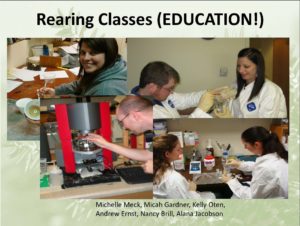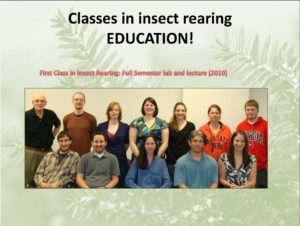One of the major purposes of the Insect Rearing Education and Research Program at NCSU is education. I have pointed out frequently that insect rearing is unusual among entomology disciplines in being almost entirely done by people with nor formal background in the rearing profession–only on-the-job training. In the beginning of the 21st Century, through discussions with Drs. Frank Davis and Doug Inglis, and myself, we convinced the authorities at Mississippi State University to start a workshop series devoted to insect rearing, and the early success of that series has continued to current times, and I had expanded on that offering workshops in Tucson and more recently here at North Carolina State University. I had become dissatisfied with the brevity of the workshops where people had to travel to our sites from all over the world to get 5 days of rearing education, mostly by lectures and demonstrations and with some touring of facilities. I had always felt that more time was needed to cover the basics of insect rearing, and I had designed and taught several courses in insect rearing for our graduate students in the Entomology Department at NCSU (now the Department of Entomology and Plant Pathology). These semester-long courses gave students a chance to have lectures, laboratories, and to do projects on their own (with my guidance) where they were asked to design their projects as rearing efforts that were integrated with some of the analytical techniques that were taught, including biochemical analysis, texture analysis, microscopy, and a statistical basis for all projects. These courses were well-received and highly praised by students in anonymous evaluations, so I am sure that this approach is valuable. I will post some of the answers to test questions to show how sophisticated many of the students in these classes were at understanding the complexities and intricacies of insect rearing. I also
realized that the vast majority of rearing professionals and aspiring “to become professionals” can be students at NCSU or can attend the 5 day workshops taught on site, so I designed and launched courses online in the principles of insect rearing. After teaching a graduate seminar in rearing at NCSU, we started teaching lecture/lab courses in rearing (the first such class pictured above showing the whole class and some selected images of the students doing their hands-on projects = learning by doing).
Rearing Education Courses:
Synchronous (LIVE) Rearing Courses:
Please note that as of January, 2023, we are offering a new entry level to mid-level course in Insect Rearing System Fundamentals. Although I plan to keep the 3-course platform available, our current offerings will be based on the new entry level and mid-level course. The new course is shorter than the 3 courses, which lasted for a total of 12 weeks. The new course contains the main contents of the previous courses, except that it is in a more simplified form. In previous courses, I found that I was getting too complicated and detailed in trying to anticipate and meet the needs of students/participants who ranged from entry level experience to advanced backgrounds. I offer the self-criticism that the courses were becoming cluttered with my trying to provide too much information in a short period of time.
Therefore the new course is oriented to providing a clean, straight-forward rearing background. Please see the announcements for more details.
We are currently offering 3 successive courses (1 month each) in the principles and fundamentals of insect rearing. The courses are aimed at a broad audience of insect rearing participants, starting with basic, entry-level rearing knowledge through more advanced concepts of insect biology, physical, and design (engineering) principles that are basic to insect rearing systems. One of the special features of these courses is that they provide tutorials on many important aspects of insect rearing systems, including how to use design of experiments to develop and/or optimize rearing systems. See examples below.
Insect Diet Science and Technology: This course is based on Dr. Allen Carson Cohen’s book: Insect Diets, Science and Technology and Design, Operation, and Control of Insect Rearing Systems (both from CRC Press), plus recent and current research in the Insect Rearing Education and Research Program at North Carolina State University. This course is taught on a synchronous (live) basis, where PowerPoint presentations and videos will be presented and discussed. The major emphasis of this course is the nature and role of insect diets, how they are developed and improved. Classes will meet on Tuesdays and Thursdays from 2-4:30 p.m. (Eastern Time) for four (4) weeks, for a total of 20 hours of instruction. This course is current being offered in October 2021. Click here to register for this course.
Insect Rearing System Operations: This course is based on Dr. Allen Carson Cohen’s book: Insect Diets, Science and Technology and Design, Operation, and Control of Insect Rearing Systems (both from CRC Press), plus recent and current research in the Insect Rearing Education and Research Program at North Carolina State University. This course is taught on a synchronous (live) basis, where PowerPoint presentations and videos will be presented and discussed. The emphasis of this course is a survey of major rearing systems that have proved to be successful for mass rearing such insects as tephritid fruit flies, several species of moths and butterflies, Hemiptera, lacewings, and beetles. The focus is on how the components of rearing systems interact. Classes will meet on Tuesdays and Thursdays from 2-4:30 p.m. (Eastern) for four (4) weeks, for a total of 20 hours of instruction. This course is current being offered in November, 2021. Click here to register for this course.
Design and Control of Insect Rearing Systems: This course is based on Dr. Allen Carson Cohen’s book: Insect Diets, Science and Technology and Design, Operation, and Control of Insect Rearing Systems (both from CRC Press), plus recent and current research in the Insect Rearing Education and Research Program at North Carolina State University. This course is taught on a synchronous (live) basis, where PowerPoint presentations and videos will be presented and discussed. The design and control aspects of rearing systems are the centerpiece of this course with special emphasis on factors of stress, error, quality and process control. Classes will meet on Tuesdays and Thursdays from 2-4:30 p.m. (Eastern) for four (4) weeks, for a total of 20 hours of instruction. This course is current being offered in December, 2021. Click here to register for this course.


